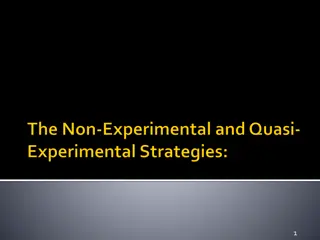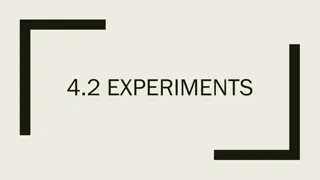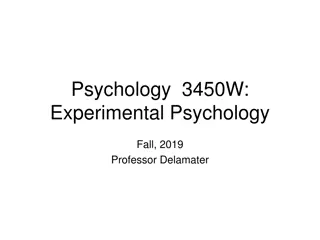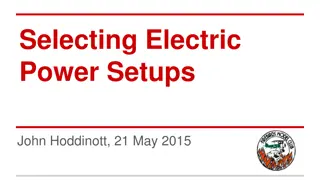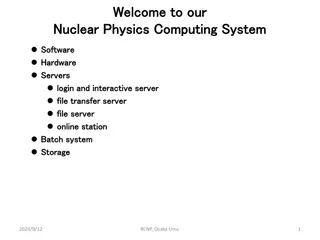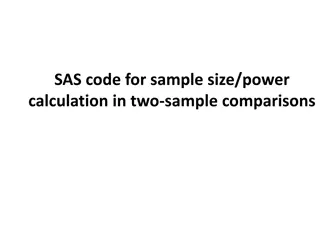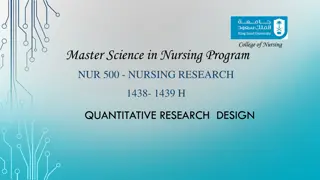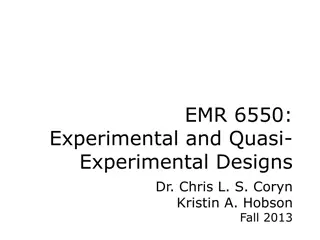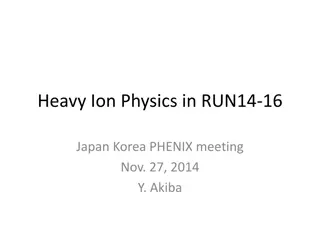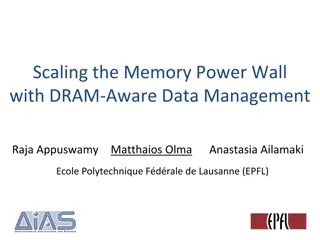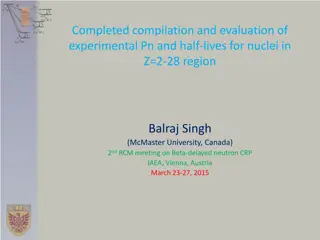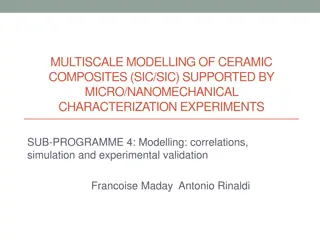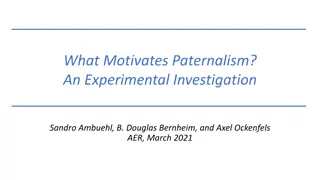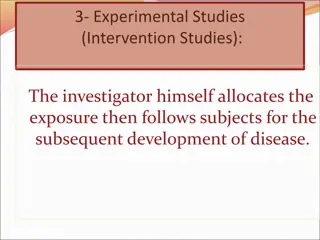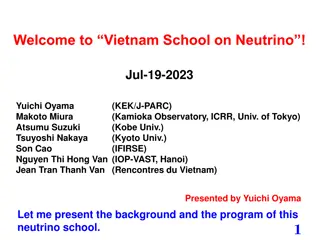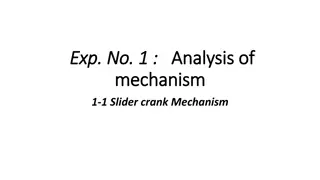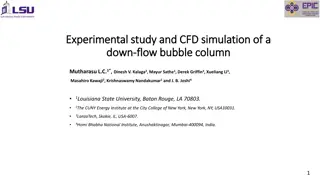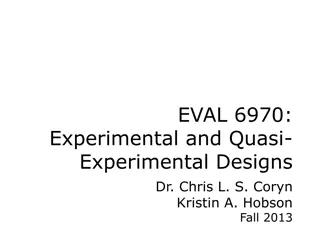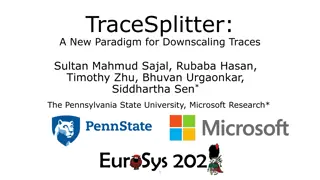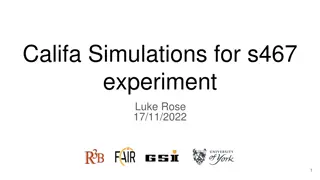Introduction to Experimental Economics by John Hey: A Comprehensive Overview
Explore the interconnected realms of Experimental Economics and Behavioral Economics through the insightful lectures of John Hey, an Emeritus Professor at the University of York. Discover the methodology of testing economic theories for validity and the practical applications of experimental economi
1 views • 58 slides
Insights on Experimental ASF Vaccines in Pig Studies
The research conducted by Prof. Jishu Shi and his team at Kansas State University delves into the safety and efficacy testing of experimental African Swine Fever (ASF) vaccines using pigs as the model. Various vaccines, including DNA vaccines and live attenuated viruses, were tested against differen
4 views • 13 slides
Innovations in Pixel Detector Technology for Photon Science
Technologies and advancements in pixel detector development for photon science applications are showcased in this content. Topics discussed include balancing gain and dynamic range in hybrid pixel detectors, performance assessments of integrating pixel detectors, and strategies for photon detection
4 views • 21 slides
Understanding Nonexperimental and Quasi-experimental Studies
Nonexperimental and quasi-experimental studies resemble experiments but lack random assignment, making them valuable for group comparisons without establishing causation. This type of research design looks at differences between groups that already exist, focusing on group differences rather than ca
1 views • 35 slides
Understanding Experiments in Research: Observation vs. Experimentation
Observation and experiments are two crucial methods in research. An observational study involves observing and measuring variables without influencing responses, while an experiment deliberately applies treatments to measure responses. Confounding variables can affect the results, and factors like e
0 views • 13 slides
Understanding Experimental Psychology: Designs and Control Issues in Research
This content delves into the basics of experimental research, focusing on different types of experimental designs and control issues. It covers between-group and within-group designs, discussing advantages and disadvantages, as well as methods for controlling for nonequivalence. The importance of ra
0 views • 26 slides
Understanding Probability: Experimental and Theoretical Concepts
Probability is the measure of the likelihood of an event happening, with experimental and theoretical probability being key concepts. Experimental probability involves determining probabilities through experience or experiments, while theoretical probability can be calculated without prior experienc
2 views • 23 slides
Laboratory for Teaching Laser and Atomic Physics at AAPT Conference
Explore the laboratory curriculum for teaching laser and atomic physics developed by Joseph E. Wiest at West Virginia Wesleyan College. The course encompasses electro-optics, quantum models, optics concepts, laser operations, and experimental objectives. Discover the history and applications of vari
0 views • 41 slides
Understanding Electric Power Setups for Efficient RC Models
Exploring the components, advantages of brushless motors, importance of setup, key definitions, and a detailed process for selecting the right power setup for optimal performance in RC models. From estimating power needs to testing setups, this guide covers all aspects to enhance your flying experie
0 views • 26 slides
Review of Boiling Water Experiment - Analysis and Feedback
A detailed review of a boiling water experiment conducted in Greece, analyzing the presentation of theories, experiments, and results. The reporter's lack of theoretical basis and experimental details was highlighted, while the opponent raised insightful questions and corrections. Emphasis was place
3 views • 10 slides
Impact of Dissolved Oxygen and Flow Rate on Watercress Germination and Growth
A study by Claire Cleveland and Dr. Laurie Mauger explores the effects of dissolved oxygen concentration and flow rate on watercress germination and growth. The research includes ecological markers, existing evidence, hypothesis, experimental design, and anecdotal results indicating that watercress
0 views • 15 slides
Nuclear Physics Computing System Overview
Explore the Nuclear Physics Computing System at RCNP, Osaka University, featuring software, hardware, servers, interactive tools, and batch systems for research and data processing. Discover the capabilities of Intel Parallel Studio, compilers, libraries, MPI applications, and access protocols for e
0 views • 16 slides
SAS Code for Sample Size and Power Calculation in Two-Sample Comparisons
SAS code snippets are provided for conducting power and sample size analyses in two-sample comparisons using the TWOSAMPLEMEANS statement. The code covers scenarios such as two-sample t-tests assuming equal variances, unbalanced designs, unequal variances, and more. Examples and syntax are included
0 views • 10 slides
Quiz Review on Scientific Method and Graphing
Explore a quiz review covering topics related to scientific method, graphing, and experimental design. Understand key concepts such as hypothesis, scientific law, theory, variables, and experimental control through detailed questions and images. Test your knowledge on laboratory safety, inferences,
0 views • 14 slides
Enhancing Vacuum Performance with Activated Charcoal Fabric in Multi-Layer Insulation Systems
Multi-layer insulation (MLI) systems play a crucial role in cryogenic applications, affecting vacuum quality and efficiency. This study explores the use of activated charcoal fabric (ACF) as a potential replacement for traditional spacer materials in MLI, enhancing cryopumping performance. By incorp
0 views • 16 slides
Understanding the Photoelectric Effect: Dr. Samir Kumar Giri's Research
The photoelectric effect, first observed by Heinrich Hertz in 1887, involves the ejection of electrons from a metal plate when light shines on it. Dr. Samir Kumar Giri from Kharagpur College delves into this phenomenon, exploring how the kinetic energy of photoelectrons depends on light frequency ra
0 views • 11 slides
Understanding Quantitative Research Designs in Nursing
Delve into the world of quantitative research in nursing, exploring different research designs and the concept of causality. Learn about experimental, quasi-experimental, and non-experimental designs, as well as the characteristics of experimental design like manipulation, control, and randomization
0 views • 22 slides
Quasi-Experimental and Interrupted Time-Series Designs Overview
Explore the various quasi-experimental designs, control groups, pretests, and outcome patterns in research methodologies. Understand the implications of different outcome patterns on causal interpretation and validity threats in experimental studies.
0 views • 31 slides
R&D and Simulations on Gain Stability and IBF for ALICE GEM-TPC Upgrade
The research and development efforts, along with simulations, focus on enhancing gain stability and addressing issues related to Ion Back Flow (IBF) for the ALICE GEM-TPC upgrade. Detailed outline, status updates, and major challenges are discussed, highlighting the significance of the upgrade for i
0 views • 24 slides
Heavy Ion Physics at RHIC: RUN14-16 Overview
Exploring heavy ion physics at RHIC through the RUN14-16 campaigns, focusing on measuring heavy quarks like charm and bottom, the experimental setups, beam energies, and the significance of probing Quark Gluon Plasma using heavy quarks. Detailed information about the runs, detectors used, and the ma
0 views • 19 slides
Arduino Circuit Challenges for Learning and Fun
Explore a series of challenges to build, program, and experiment with Arduino circuits, ranging from basic LED setups to utilizing sensors like LDR for advanced projects. Start with simple tasks and progress to more complex setups to enhance your knowledge and skills in electronics and programming.
0 views • 10 slides
Understanding Experimental Design in Biology
Explore key concepts in experimental design in biology through clicker questions focusing on hypotheses, variables, control groups, and experimental groups. Learn how scientists test hypotheses and analyze results to draw valid conclusions in biological studies.
0 views • 15 slides
Understanding Power Consumption in Memory-Intensive Databases
This collection of research delves into the power challenges faced by memory-intensive databases (MMDBs) and explores strategies for reducing DRAM power draw. Topics covered include the impact of hardware features on power consumption, experimental setups for analyzing power breakdown, and the effec
0 views • 13 slides
Compilation and Evaluation of Experimental Data for Nuclei in Z=2-28 Region
Completed compilation and evaluation of experimental Pn and half-lives for nuclei in the Z=2-28 region, led by Balraj Singh at McMaster University. The work involved preparing lists of neutron-rich nuclides, identifying potential emitters, analyzing available experimental data for 1n, 2n, 3n, and 4n
0 views • 20 slides
Advances in Ceramic Composite Property Modeling and Experimental Characterization
European research focuses on advanced modeling of C/C, C/SiC, and SiC/SiC composites for aerospace and nuclear applications, with an emphasis on correlating simulations with experimental validation. Laboratories are progressing towards a multiscale approach, integrating micro/nanomechanical characte
0 views • 5 slides
What Motivates Paternalism? An Experimental Investigation
Centuries of normative debate on paternalism have resulted in its ubiquity in various aspects of society, from consumer protection to safety regulations. However, there is a scarcity of empirical studies on the motivations behind paternalistic interventions. This experimental investigation delves in
0 views • 12 slides
Understanding Experimental Studies: Intervention, Characteristics, and Measurements
Experimental studies involve the investigator assigning exposures and following subjects to observe disease development. Different types of experimental studies exist, such as preventive and therapeutic types, each with its limitations, including ethical concerns and challenges in recruiting subject
0 views • 13 slides
Understanding Research Methods and Data Analysis
This review covers topics such as experimental classification, the comparison of non-experimental and experimental research, software features like JMP and SPSS, outlier handling in data analysis, and levels of measurement in statistical analysis.
0 views • 13 slides
Vietnam Neutrino School Overview
Vietnam School on Neutrino is an annual event started in 2017 to promote experimental neutrino physics in Vietnam. Led by Prof. Jean Tran Thanh Van, the school focuses on lectures, software and hardware training, group works, and excursions. With a mix of students from various countries, the aim is
0 views • 7 slides
Analysis of Slider-Crank Mechanism and Experimental Data
Slider-crank mechanism analysis involves understanding the transformation of input motion into desired output motion. This mechanism consists of a crank, coupler, slider, and ground link, converting circular motion into linear motion. Experimental procedures involve setting crank angles and recordin
0 views • 6 slides
Experimental Study and CFD Simulation of a Down-flow Bubble Column
This study and simulation focus on the experimental setup, measurement techniques, and results of a down-flow bubble column. It explores novel features such as inverted bubbly flow, micro-bubble generation, and gas injection. Detailed analysis includes axial and radial variations of volumetric gas h
0 views • 25 slides
Understanding Experimental and Quasi-Experimental Designs
Explore the foundations of experimental and quasi-experimental designs, delving into causal relationships, counterfactual reasoning, and the importance of validating statistical and internal conclusions. Learn about causes, effects, and the complexity of determining causation in research. Discover R
0 views • 46 slides
Understanding Probability: Learning Outcomes and Examples
This content delves into the study of probability, covering topics such as representing probabilities of simple and compound events, calculating relative frequencies, multi-step chance experiments, theoretical and experimental probabilities. It explains concepts like chance experiments, sample space
0 views • 31 slides
TraceSplitter: A New Paradigm for Downscaling Traces
This study introduces TraceSplitter, a novel approach for downscaling traces to run on smaller setups effectively. It discusses the need for downscaling in production and experimental setups, focusing on load balancing techniques. The paper compares prior approaches such as timespan scaling, average
0 views • 18 slides
Exploring High IOPS Applications and Server Configurations
Dive into the world of high IOPS applications, memory buffer configurations, and file server setups with a series of detailed images showcasing various server environments and code memory management. Discover the importance of optimizing IOPS for efficient data processing and explore advanced server
0 views • 16 slides
Understanding Experimental Studies in Epidemiology
Epidemiological studies and experimental studies play vital roles in understanding cause-and-effect relationships in research. Experimental studies involve manipulating independent variables and measuring dependent variables, with categories such as true experimental, quasi-experimental, and pre-exp
0 views • 22 slides
Califa Simulations and Experimental Observations in Nuclear Physics Research
Exploring nuclear physics research through Califa simulations and experimental observations with a focus on PID gating, clustering algorithms, beam settings, and Ca isotopes chain gating. The study involves simulating events on CH2 targets, analyzing clustering effects, and observing opening angles
0 views • 10 slides
FY25 LBS Lab OMEGA/OMEGA EP Proposed Campaign
Proposed campaign in FY25 by the LBS Lab to measure specific deliverables, compare results with experimental and theory PIs, collaborate with others, and assess technical issues such as target fabrication feasibility. The campaign involves motivation, relevant milestones, previous/simulated results,
0 views • 6 slides
Organization and Setup Details for Green Bay Eye Seminar on February 10, 2018
Details for the Green Bay Eye Seminar on February 10, 2018, include requirements such as coat racks, garbage cans, tables for catering, and various setups in different areas like the Eagle Event Center and Lecture Hall SC130. Specific arrangements are needed for check-in, sponsor tables, catering se
0 views • 4 slides
The Role of Desktop Rentals in Temporary Office Setups
In this PPT, we explained about the role of desktop rentals in office setups. VRS Technologies LLC offers top-notch Desktop Rental Dubai services to help you stay productive. Explore our range of desktops perfect for short-term setups. Call 971-55-5
0 views • 8 slides


